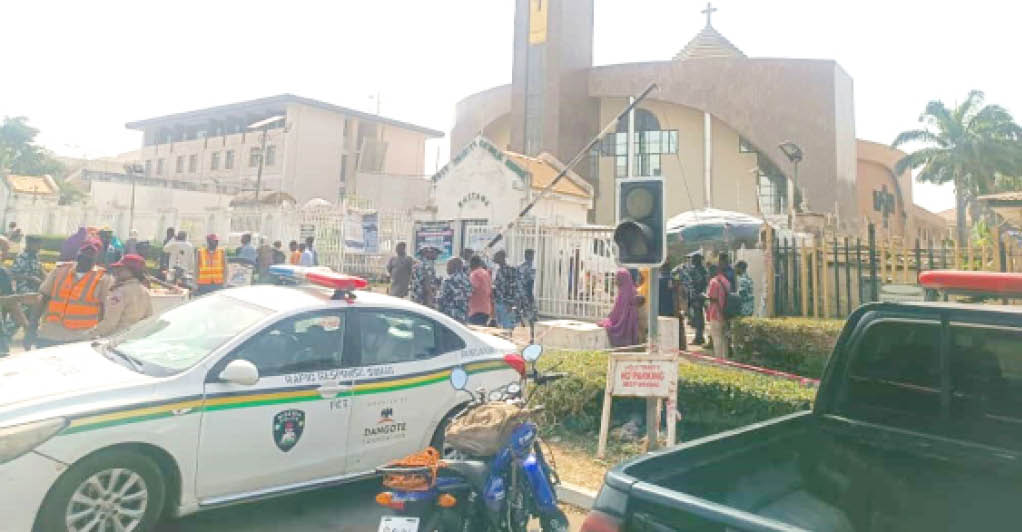Death from stampedes: Urgent need to address hunger issue
The tragic loss of over 50 lives in Nigeria due to stampedes during philanthropic food distributions highlights an increasingly dire reality: hunger has become a national crisis. These deaths are a sobering reminder of the desperation many Nigerians face daily. They are not just statistics but lives lost in a grim struggle for survival. These […]

Police Rapid Respond Squad at the entrance of Holy Trinity Church Maitama, after the stampede in Abuja on Saturday
The tragic loss of over 50 lives in Nigeria due to stampedes during philanthropic food distributions highlights an increasingly dire reality: hunger has become a national crisis. These deaths are a sobering reminder of the desperation many Nigerians face daily. They are not just statistics but lives lost in a grim struggle for survival. These events underscore the growing disconnect between government policies and the daily realities of the masses.
While philanthropy has stepped in to provide some relief, it is a stopgap measure and not a solution. The underlying issues driving millions to jostle for a bag of rice remain unresolved. Hunger is not merely about the absence of food—it reflects systemic failures in governance, economic planning, and social welfare. The policies introduced by President Bola Ahmed Tinubu, though aimed at economic reform, have inadvertently worsened the plight of the average Nigerian.
The removal of fuel subsidies, for instance, has had a cascading effect on the economy. Transportation costs have soared, making food and other essentials more expensive. Inflation has eroded purchasing power, pushing even middle-class Nigerians into financial insecurity. A loaf of bread or a bag of rice, which used to be accessible, now feels like a luxury for many. This has left millions of households grappling with hunger and poverty, creating a breeding ground for despair and instability.
The sight of people risking their lives for food is a clear indication of a society in distress. It is a call to action for the government to prioritize policies that address the root causes of this crisis. Philanthropic gestures, while noble, should not be the backbone of food security in a nation as resource-rich as Nigeria. The government must take the lead in ensuring that every citizen has access to affordable food and basic necessities.
First, there is an urgent need for a comprehensive and transparent social welfare program. Direct cash transfers, food vouchers, or subsidies targeted at the most vulnerable populations can provide immediate relief. These programs must be insulated from political interference and administered with integrity to ensure they reach the intended beneficiaries. Transparency in the implementation of social welfare schemes will restore trust in the government’s capacity to care for its citizens.
Second, agriculture holds the key to long-term food security. Nigeria is blessed with vast arable land and a favorable climate for farming. Yet, the sector remains underdeveloped due to neglect, poor infrastructure, and limited access to modern farming techniques. By investing in agricultural development, the government can boost local food production, reduce dependency on imports, and create jobs. Farmers need support in the form of subsidies for inputs like seeds and fertilizers, access to modern machinery, and reliable markets to sell their produce.
Third, the issue of unemployment must be addressed with urgency. Hunger and poverty are directly linked to a lack of income. The government must prioritize job creation by investing in industries that can absorb a large workforce, such as agriculture, manufacturing, and renewable energy. Policies that encourage entrepreneurship and provide access to credit for small businesses can also empower citizens economically, reducing their dependence on handouts.
Additionally, there is a need for fiscal policies that mitigate the impact of economic reforms. For instance, the revenue saved from the removal of fuel subsidies should be transparently reinvested into projects that benefit the masses, such as public transportation, healthcare, and education. Such measures would not only provide immediate relief but also lay the foundation for sustainable development.
Finally, the government must engage in genuine dialogue with the people. Policies that affect the masses should be introduced with empathy and a clear plan to cushion their effects. Public communication must be transparent, and the voices of ordinary Nigerians should be heard and respected. By fostering a culture of inclusivity and accountability, the government can rebuild trust and reduce the discontent that often leads to unrest.
The stampedes we have witnessed are a tragic wake-up call. They symbolize the deepening hardship in the country and the urgency of addressing hunger as a matter of national priority. Beyond the numbers, these are lives cut short and families plunged into deeper despair. The government cannot afford to delay action any longer.
History will not judge this administration by its intentions but by the tangible steps it takes to improve the lives of Nigerians. Alleviating hunger and addressing economic hardship is not just a moral obligation—it is a necessity for the survival and stability of the nation. The time to act is now.
Alfred Okoye, a public affairs analyst wrote from Mpape, Abuja
